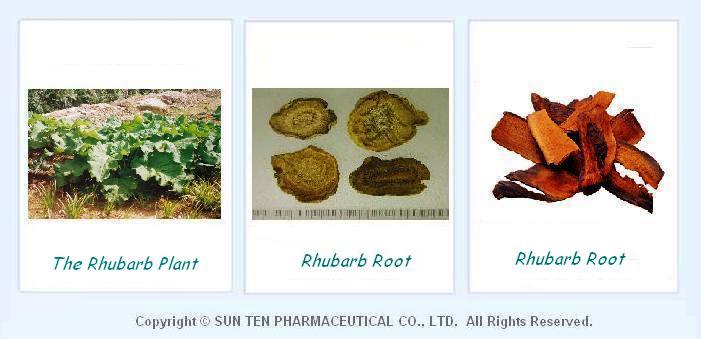Rhubarb (Rheum Palmatum; Da Huang)
TCM Herbal Story
Rhubarb (Rhizoma Rhei; Da Huang)
Once upon a time, there was a doctor Huang who would harvest herbs to create medicines for the ill. An expert on the healing properties of Coptis Rhizome (Huang Lian), Astragalus (Huang Qi), Polygonatum Root (Huang Jing), Scute (Huang Qin), and Rhubarb (Huang Gen), his patients all call him Mister Five Huang. Every March, the doctor would venture into the mountains to harvest herbs, and lodge in farmer Ma Jun's house till the end of fall. The Ma family was extremely hospitable to the doctor, and as time passed by, they developed a strong bond.
Then one year, disaster struck the Ma family. A great fire had burned down their house, along with all their belongings. Only Ma Jun and his sun had survived by escaping to a cave, which sadly became their home. The doctor looked everywhere in search of the Ma family that had taken care of him for so many years. When he finally found the poor father and son living in a cave, he told Ma Jun, “Bring your son along and we'll make a living off of traditional Chinese medicine!” And so they became lifetime partners, through harvesting, selling, and curing patients with their traditional Chinese medicine. Slowly, Ma Jun became familiar with the healing properties of the five medicinal huang herbs. Occasionally, when doctor wasn't home, Ma Jun would practice on patients who came by.
On the summer of a passing year, a slender pregnant woman with a pale yellow face and fragile frame came to their practice in seek of a remedy for diarrhea. Coincidently, Dr. Huang was not home at the time, so Ma Jun took the initiative. Unfortunately, he had mixed up coptis, which is used to treat diarrheas with rhubarb, which purges fire and relaxes the bowels, and gave it to the pregnant woman. As a result, the pregnant woman's diarrhea worsened, nearly losing her life, as she suffered miscarriage. She sued all the way to the county court. The judge immediately sent his men to arrest Ma Jun, for the charge of inflicting harm through mountebankery.
When Doctor Huang caught wind of the news, he hurriedly went to court. With both knees on the ground, he begged the judge to charge him with the crime, claiming that he was Ma Jun's teacher, and hence should be responsible for the harm; but Ma Jun's heart felt worse for what he had done, and was willing to admit the crime and face the judge's punishment. The county judge admired their friendship, so much that, when he considered the Mister Five Huang's untarnished reputation, the pregnant woman's already weak constitution, and her short pregnancy period, he ruled that a monetary punishment from the two of a few silvers was enough, and set them both free. But before he let them go, the district judge said to the doctor, “The rhubarb used in the five huang herbs acts much stronger than your other four medicinal herbs, so you should change its name, to prevent future confusions that may lead to more trouble.” The doctor deeply thanked the judge. As he went home, he changed rhubarb's name from Huang Gen to "Da" Huang (Da stands for "big" in Chinese) better differentiate the two, and the name slowly spread to popular use.
The dried roots and rhizome of rhubarb are from the plant Rheum palmatum L., Rheum tanguticum Maxim. ex Balf. or Rheum officinale Baill. of the Polygonaceae family. It has a cold property, bitter taste, and enters through the heart, large intestine, liver and stomach.
Actions & Indications:
- Drains heat and purges accumulations
- Drains damp-heat
- Drains heat from the blood
- Invigorates blood and dispels blood stasis
- Clears heat obstructing the blood level
- Clears heat and reduces fire toxidity
Caution & Contraindications:
- Use with extreme caution during pregnancy
- Nursing mothers should not use because active ingredients will enter the milk
- Do not use in cases of Qi or blood deficiency.
- Do not use when cold from deficiency of the Stomach and Spleen.
The original article is from Brion Research Institute, translated by Sun Ten Pharmaceutical Co., Ltd.
For the Chinese/original version, please click:
http://www.brion.org.tw/index.php?option=com_content&task=view&id=242&Itemid=22
